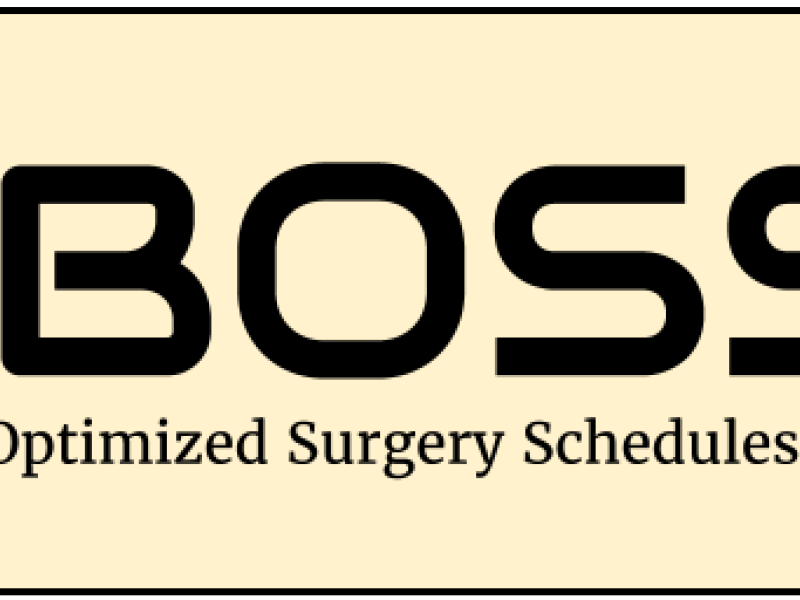The health care sector is one of the most important economy branches in Germany which is subject to steadily increasing expenses over the last years. One of the main cost components are hospitals. In particular, operating rooms generate a huge portion of the hospitals expenses. In the future, a more efficient operation room management is needed to reduce operating cost and staff overtime to allow patient therapies of higher quality.
Project Description
The project Information-Based Optimization of Surgery Schedules (IBOSS) focuses on the development of new and efficient methods to improve the individual work- and patient flow in hospitals. We work closely with our project partner Charité Berlin in order to bring new algorithmic concepts for difficult problems into practice. One part of the project includes the predictive analysis of activity durations to accurately model the involved sub-processes in a hospital. On that basis, we develop algorithms to compute optimized micro- and macro-level surgery schedules. The particular focus lies on the algorithmic treatment of stochastic influences on the planned schedule, such as operational delays and sudden emergencies. Our solution methodologies are based on the following techniques
- Optimal learning of classificators in data analysis;
- Stochastic/robust resource-constrained project scheduling;
- Multiobjective Optimization and Stochastic Control of Markov Chains;
- Dynamic interplay between micro- and macro models.
The future goal is to integrate an adaptive self-learning optimization system that automatically recognizes variations and trends in a changing therapy evironment. A further objective is the implementation of a first computational test and evaluation system for practical usage.
IBOSS is also collaborating with the BMBF project HealthFaCT which aims to improve the health care supply in rural areas.
Data Analysis and Machine Learning
The accurate estimation of surgery durations is the first step in the IBOSS pipeline. We develop methods to train or dynamically adapt robust low-dimensional (sparse) classifiers with machine learning methods from (a) available historical data and (b) daily new data. Data features are patient specific (e.g. patient age, gender), staff specific (e.g. surgeon, anaesthesiologist), diagnosis specific (e.g. kind of disease, part of the body) and more. Sparse classifiers allow to overcome the main disadvantages of classical approaches that do not perform feature selection. Reducing the classifier to only the necessary information resolves the problem of unsatisfied required data dimensionality and makes it possible to simultaneously optimize for classification probabilities, robustness and interpretability.
Members (Free University of Berlin):
Stochastic Operating Room Scheduling
One part of the project considers the allocation of operations to operating rooms. An operation consists of several subtasks, such as prior anesthesia, surgery preparation, surgey execution and clean-up. Each operation has individual requirements on its subtasks which may differ in duration, staff demand and specific resource availabilty. Moreover, any task is subject to stochastic durations and the planned schedule can be affected by sudden events such as emergencies. A non-sufficient consideration of such events may lead to overtime while the therapy quality deteriorates.
This motivates the study of comprehensive robust optimization methods to improve the schedule of operating rooms. In general, this problem can be modeled as stochastic Resource-Constrained Project Scheduling Problem (RCPSP), which is a very challenging combinatorial problem. In this project we are developing methods to compute robust and stochastically valuable and surgery schedules of high quality.
Members (Zuse Institute Berlin):
Past Project: Optimization of Surgery Scheduling With Uncertain Models (OPOSSUM)
Multiobjective Optimization of Dynamic Operating Room Models
Besides determining an optimal schedule for operations, there are numerous additional factors that can influence the quality of operation planning. These are, for example, allocation of personnel and medication as well as starting times for the individual subtasks. The corresponding decisions can be made with respect to multiple, in general conflicting criteria, amongst which are the quality of the medical treatment, the ability to react to unforeseen events, the satisfaction of personnel as well as patients and economic factors. This requires the computation of the set of optimal compromises between these objectives, the so-called Pareto set.
The goal of this part of the project is therefore to develop a dynamic model of the operating process which is then used in an optimization algorithm running in parallel to the real process. Hence, concurrent objectives which are subject to uncertainties as well as real-time applicability have to be taken into account. Based on the current priorities, an operation planner can select an optimal compromise from the Pareto set. Furthermore, the results can be utilized to assist and enhance the task of operation scheduling.
Members (University of Paderborn):




